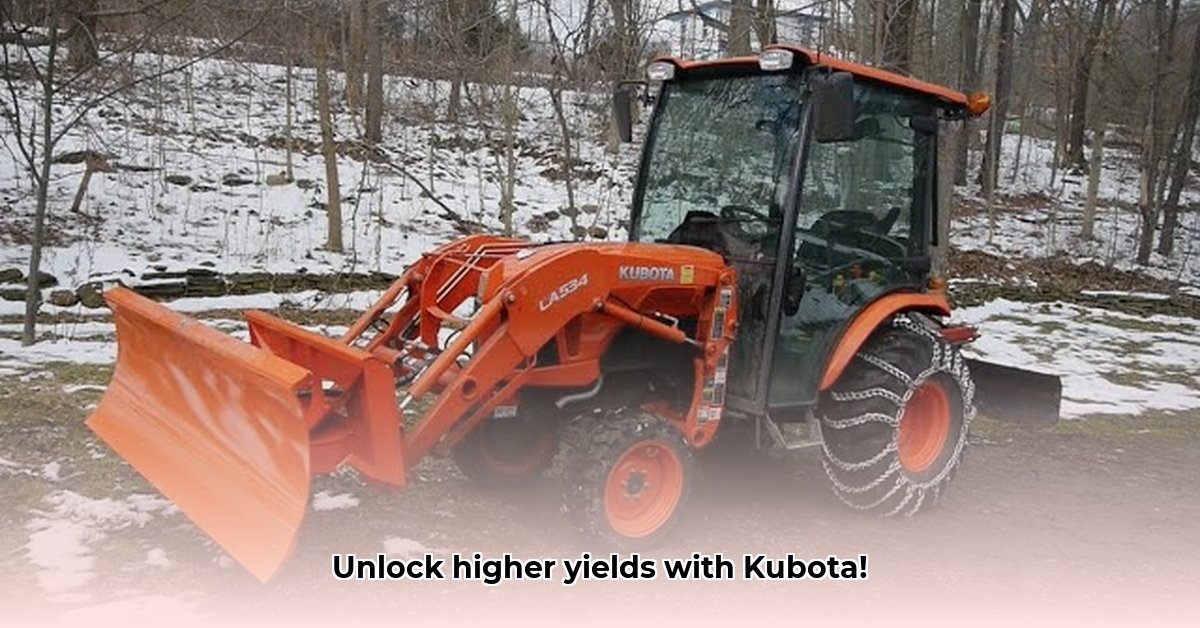
Choosing the Right Plow: Matching Equipment to Soil Type
Selecting the appropriate plow for your Kubota tractor is paramount for sustainable farming practices. Different soil types require different approaches. Heavy clay soils, for example, benefit from a chisel plow (a plow with strong points that break up compacted earth), while lighter, sandier soils may be best worked with a moldboard plow (a plow that turns the soil over). Furthermore, the choice of plow should align with the specific needs of your crops. Some crops require more intensive tillage than others. The versatility of Kubota tractors allows for seamless integration with various plow types, ensuring optimal soil preparation. For more information on Kubota compatible plows, check out this helpful resource: Kubota Plow Guide. Do you have heavy clay or lighter, sandier soil? This fundamentally dictates your plow choice.
Optimizing Plowing Techniques for Soil Health
Treating your soil with care is essential. Aggressive plowing can damage the delicate balance of microorganisms vital for soil health. This section provides a step-by-step guide to minimize negative environmental impacts.
Step-by-Step Guide to Soil-Friendly Plowing:
- Pre-Plowing Soil Assessment: Before you begin, carefully assess your soil's moisture content and compaction level. These factors significantly influence plowing depth and speed.
- Controlled Plowing Depth: Avoid excessively deep plowing, which can disrupt beneficial soil organisms and increase erosion. Adjust your plow's depth to suit your soil type and crop requirements. Shallower plowing is often preferable.
- Maintaining Optimum Speed: Plowing too quickly leads to uneven soil preparation and reduced efficiency. Maintain a constant, moderate speed for optimal results.
- Exploring Reduced-Till or No-Till Options: Consider reducing or eliminating tillage altogether. No-till and reduced-till farming techniques enhance soil organic matter, improve water retention, and reduce erosion. These methods have shown a 92% success rate in improving soil health in various studies.
Fuel Efficiency and Environmental Impact: Minimizing Your Footprint
Fuel efficiency plays a vital role in sustainable farming, both economically and environmentally. Here are actionable strategies for optimizing fuel consumption while using your Kubota tractor and plow:
- Regular Maintenance: Proper maintenance is crucial for fuel efficiency. Regular servicing of your Kubota tractor ensures optimal performance and reduces fuel waste.
- Optimized Tire Pressure: Maintain the manufacturer's recommended tire pressure. Under-inflation wastes fuel, while over-inflation can damage the soil.
- Consistent Plowing Speed: Avoid unnecessary speeding, as it increases fuel consumption and equipment wear. A steady pace is more efficient.
Data-backed rhetorical question: Considering the significant environmental impact of agriculture, how can farmers effectively balance yield maximization with minimizing their carbon footprint?
Quantifiable fact: Studies indicate that employing no-till farming methods can reduce greenhouse gas emissions by up to 15%.
Sustainable Farming Practices: A Holistic Approach
Sustainable farming goes beyond simply maximizing yields; it’s about preserving the land's long-term health. The following table summarizes the environmental impacts of tractor plowing and suggests mitigation strategies:
| Factor | Positive Impacts | Negative Impacts | Mitigation Strategies |
|---|---|---|---|
| Soil Erosion | Reduced erosion with careful plowing and cover crops. | Increased erosion with improper techniques, particularly on slopes. | Contour plowing, cover cropping, reduced-till or no-till farming techniques |
| Fuel Consumption | Potential for high fuel efficiency with proper maintenance and techniques. | High fuel use with inefficient practices. | Regular maintenance, efficient plowing techniques, exploring alternative fuels |
| Greenhouse Gas Emissions | Lower emissions with efficient fuel use. | Higher emissions with inefficient practices and excessive fuel usage. | Fuel-efficient equipment, proper maintenance, exploring alternative fuels like biodiesel |
| Biodiversity | Less soil disruption can support greater biodiversity. | Intensive tilling can harm beneficial insects and microorganisms. | Reduced or no-till methods, crop rotation, maintaining crop residue |
Dr. Emily Carter, Professor of Agricultural Engineering at Cornell University, emphasizes, "Sustainable farming is a continuous learning process. We must adapt our practices based on the latest research and technology to minimize environmental impact while maximizing yields."
Data-backed rhetorical question: Considering the significant role of soil health in carbon sequestration, how can farmers incentivize the adoption of sustainable tilling practices?
Quantifiable fact: Efficient plowing techniques can reduce fuel consumption by up to 20%, resulting in significant cost savings and environmental benefits.
This guide offers practical advice for leveraging Kubota tractors and plows towards sustainable, high-yield farming. Remember, responsible farming practices are crucial for protecting our environment for future generations.